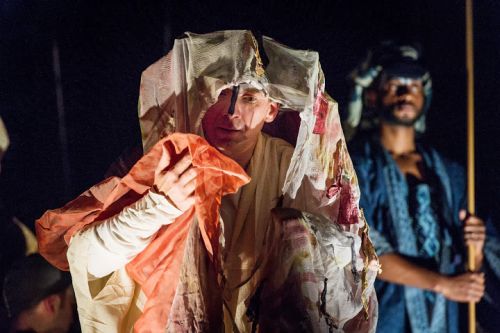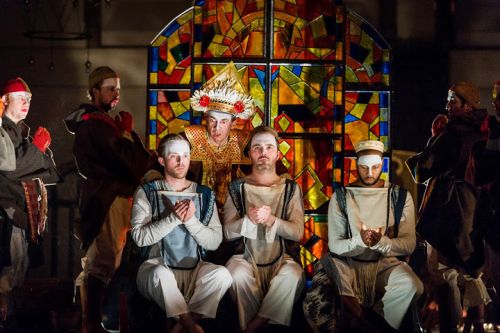 United Kingdom Britten, The Church Parables (Curlew River, The Prodigal Son, The Burning Fiery Furnace): Soloists, Mahogany Opera, Aurora Orchestra / Roger Vignoles (music director/accompanist), Orford Church, 16-17.6.2013.(RD)
United Kingdom Britten, The Church Parables (Curlew River, The Prodigal Son, The Burning Fiery Furnace): Soloists, Mahogany Opera, Aurora Orchestra / Roger Vignoles (music director/accompanist), Orford Church, 16-17.6.2013.(RD)
Curlew River
The Abbot : Lukas Jakobski (bass)
The Ferryman: Rodney Earl Clarke (baritone)
The Madwoman : James Gilchrist (tenor)
The Traveller : Samuel Evans (baritone)
The Prodigal Son
The Abbot/The Father : Lukas Jakobski (bass)
The Tempter: James Gilchrist (tenor)
The Elder Son : Rodney Earl Clarke (baritone)
The Younger Son : John McMunn (tenor)
The Burning Fiery Furnace
The Abbot/The Astrologer : Lukas Jakobski (bass)
Nebuchadnezzar : James Gilchrist (tenor)
Ananias (Shadrach) : Samuel Evans (baritone
Misael (Meshach) : John McMunn (tenor)
Azarias (Abednego) : Rodney Earl Clarke (baritone)
Chorus of Monks : Andrew Dickinson, Alastair Digges, Julian Stocker, Douglas Nairne, Richard Latham, Tichard de Winter, Bryan Benner, James Arthur
Spirit of the Dead Boy, Angel, Entertainers, Young Servants and Distant Voices : William Rose, Lucas Evans, Otto Richardson, Alfie Evans, Theo Christie
Production:
Frederic Wake-Walker: Director
Kitty Callister: Designer (after original designs by Mara Amats)
Ben Payne: Lighting designer

Photo: (c) Ginny Macbeth
Britten’s Church Parables date from the 1960s, when he set aside the onerous demands of full-blown opera (Grimes, Billy Budd, Gloriana, Midsummer Night’s Dream) and returned to the subtle sounds of an intimate chamber ensemble. Projects like the War Requiem and Cello Symphony took precedence over opera, though he also generated two sequences for children’s voices: The Children’s Crusade and The Golden Vanity. Noyes Fludde (1957) was really the precedent for his mid-sixties trilogy. Only in 1969 did he start his next full opera, Owen Wingrave.
Instead came the Church Parables. Britten composed this sequence of ravishing stage panels, to filigree texts by William Plomer, for a handful of vocal soloists and challengingly-written small chorus, led by a resonant bass Abbot. Here at Aldeburgh, the superb voice and sensitive presence of Lukas Jakobski, a Royal Opera House young alumnus initially trained in Poznań, Poland, filled the bill wondrously well.
This Abbot presides over the chorus of monks, framing each Parable and offsetting the key roles, as the beneficent Father in The Prodigal Son (1969 – the last composed) and as the fawning Astrologer who gets Shadrach, Meshach and Abednego consigned to the flames in The Burning Fiery Furnace.

Half a dozen instruments are deployed: not exactly the same in each Parable (viola and trumpet are included for Prodigal Son; viola and alto trombone make Nebuchadnezzar’s furnace glow). Percussion and chamber organ registrations vary appropriately to the demeanour of each piece, such as the oriental tinge of Curlew River, vividly derived by Plomer from the heartwrenching Japanese Noh play Sumidagawa, which Britten and Pears saw in Tokyo in February 1956.
The organ was sensitively played – and each instrumental sequence perfectly timed – by the expressive accompanist Roger Vignoles, who came into his own directing the bristling Aurora Orchestra soloists into producing astonishing effects. The horn, so devastating at the start of Peter Grimes (which is being staged just up the coast on Aldeburgh beach), is the most telling character among the instruments, but harp and sundry flute sounds are crucial; and the viola, in the temptation scenes of The Prodigal Son, is searing (the composer’s own instrument is invariably an ambiguous presence in Britten’s works, particularly in ‘violation’ scenes – and there are plenty of those in Britten).
The pièce de résistance in Frederic Wake-Walker’s brilliantly blocked, deeply intelligent production(s) – alongside the all-male chorus (with stylised hand and body gestures, hovering between troubled commentary and touches of uproarious hilarity) – was the superlative tenor James Gilchrist, weaving wonders from the Peter Pears roles of The Tempter (Prodigal Son), the preening Nebuchadnezzar (Fiery Furnace) and the most powerfully pleading of all, the child-bereft Madwoman from the mountains, in Curlew River.
Gilchrist’s beautifully articulate voice, equally relished in Baroque recitative, German Lied and English Art Song, is a positive miracle in this subtlest of Britten repertoire. He is already one of the subtlest interpreters, on and off CD, of Britten’s Serenade for Tenor, Horn and strings). Yet not even his sly Tempter, luring the spendthrift Younger Son into an Albert Herring-like orgiastic spree, or his snaky, scarlet-girt Babylonian King could eclipse the extraordinary anguish of his pink-cradled Madwoman, advocated for by a noble-voiced Traveller (Samuel Evans) and counterpointed with the slightly fruity, near other-worldly timbres of baritone Rodney Earl Clarke as the Ferryman (a role Clarke made his own, to universal admiration, in Graham Vick’s Birmingham production of Curlew River, acclaimed at the BBC Proms.)
The icing on the cake here was 13 year old William Rose, one of several boy soloists from Suffolk’s endlessly inspired Jubilee Opera company, as the soul of the Madwoman’s lost, dead son, movingly shadowed by Lighting Director Ben Payne behind the Ferryman’s unfurled sail. Rose’s voice (along with his instinctive acting, a bewitching feature of many past productions in Aldeburgh’s Jubilee Hall – location for many a Britten premiere) might be heading, distantly, for breaking point. But his control is still there, all the more remarkable and impressive, for this was as melting a performance vocally as visually. Rose’s stage presence – confirmed during a surprisingly sexy, come-on dance to Royal command he shared with the cheekily daring Alfie Evans and one other in The Burning Fiery Furnace – is frankly gobsmacking for one so young. His elder brother Jamie, another tested young singer-actor, was one of the behind scenes production assistants. Lucas Evans, Otto Richardson and Theo Christie were the other pleasingly well-prepared, quick-witted Jubilee trebles assuming key parts in the triptych.
It was the virtuous consigned to the flames rather than pardoned youthful indiscretion that impinged most, although the chorus octet’s Pandora’s box of besotting gestures, and Gilchrist’s patent acting genius with its thrilling gift for poignant or slinky characterisation, gave The Prodigal Son its own special poignancy, with Rodney Clarke again memorable as the verging on venomous Elder Brother, the distanced sibling pair patiently refereed by the looming, authoritative Jakobski.
Wake-Walker’s aides in masterminding this superbly engineered triptych were Payne’s vastly evocative Lighting Design – every shadow and glimmer and scintilla of white light counted; and the “not so much Set as Properties and Costumes Designer” Kitty Callister, who dotted the stage with versatile monkish furniture, clad the chorus in ingeniously colour-coded, skullcap-topped outfits and dished up a miracle in Nebuchadnezzar’s effortlessly-erected furnace made of dappled glass: kaleidoscopic and brazenly garish, like coloured shards of falling tearsfrom which the alluring sound of treble Lucas Evans rose touchingly as the redemptive voice of The Angel.
Dicing, partying, grieving, close attending, it was the meticulously directed chorus, in an astonishing feat of memory, who supplied, with their gamut of patterned moves, the ‘concept’ behind – or possibly the heart of – this endlessly versatile production.
One monk, Douglas Nairne, was the other principal worth naming. He emerged in a modest cameo as the Babylonian Herald, and pleasingly good those vignettes were too. Nairne was the second of my high-quality Heralds in a week, having seen Rhys Jenkins understudy magnificently for Simon Thorpe – promoted to Telramund – in WNO’s Lohengrin.
Good things famously step out in pairs; but in Aldeburgh’s centenary revival at Orford, the Church that was the Parables’ original venue, Wake-Walker’s electrifying stagings supplied an unforgettable case of excellence marching in threes.
Roderic Dunnett
For a second opinion, see Martyn Harrison’s review